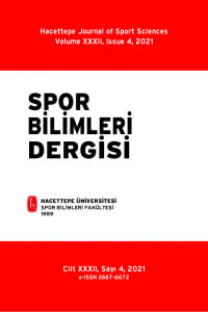ÖĞRETMENLİK UYGULAMASI DERSİNİN ÖĞRETMEN YETERLİĞİ ÜZERİNE ETKİSİ.
Bu çalışmanın amacı Abant İzzet Baysal Üniversitesi Eğitim Fakültesi ve Beden Eğitimi Öğretmenliği Bölümünde okuyan ve öğretmenlik uygulaması dersini alan öğretmen adayların bu ders süresince öğretmen yeterliklerindeki değişimleri incelemektir. Araştırmaya Eğitim Fakültesinin çeşitli bölümlerinde ve Beden Eğitimi Öğretmenliği bölümünde okuyan ve öğretmenlik uygulaması dersini alan 238 öğretmen adayı katılmıştır. Araştırmada Tschannen-Moran ve Woolfolk-Hoy (2001) tarafından hazırlanan ve Türkçeye Işıl Aktağ (2003) tarafından çevrilen Öğretmen Yeterliği Ölçeği kullanılmıştır. Ayrıca bütün öğretmen adaylarına hem ön-test hem de son-testte açık uçlu sorular sorulmuştur. Veriler t test bağımlı değişkenler kullanılarak analiz edilmiştir. Araştırma sonuçlarına göre öğretmen adaylarının öğretmen yeterliği ortalaması X=7.17 ± .64 olarak bulunmuştur. Araştırmaya katılan öğretmen adaylarının öğretmen yeterliği cinsiyete göre değişiklik göstermemektedir. Ayrıca öğretmenlik uygulaması dersinin öğretmen adayları üzerinde anlamlı bir etkisi bulunamamıştır. Öğretmen adaylarının açık uçlu sorulara verdikleri yanıtlar derlenerek temalar elde edilmiştir. Elde edilen bu temaların bazıları anketin alt boyutlarıyla birebir örtüştüğü gibi sınıf yönetimi, öğrenci katılımı ve öğretim yöntemleri, araştırmada öğretmen adayları tarafından sıklıkla vurgulanan tema olarak iletişim ortaya çıkmıştır
Anahtar Kelimeler:
Öğretmen yeterliği, Öğretmen adayı, Cinsiyet, Öğretmenlik uygulaması
ÖĞRETMENLİK UYGULAMASI DERSİNİN ÖĞRETMEN YETERLİĞİ ÜZERİNE ETKİSİ.
Keywords:
-,
___
- Aktağ I, Walter J. (2005). Öğretmen adaylarının mesleki yeterlik duygusu. Spormetre, 3(4), 127-131.
- Ashton PT, Webb R B. (1986). Making a Difference: Teachers’ Sense of Efficacy and Student Achievement . New York: Longman.
- Ashton PT. (1984). Teacher efficacy: A motivational paradigm for effective teacher education. Journal of Teacher Education, 35(5), 28-32.
- Bandura A. (1977). Self efficacy: Toward a unifying theory of behavioral change. Psychological Review, 84, 191-215.
- Bandura A. (1986). Social Foundations of Thought and Action: A Social Cognitive Theory. Engelwood Cliffs, NJ, USA: Prentice Hall.
- Bandura A. (1997). Self-Efficacy: The Exercise of Control . New York:W.H.Freeman
- Barney D, Pleban F. (2006). Pre-service physical education teachers’ perception of teaching before and after a semester long elementary education practicum experience. Physical Educator, 63(1).
- Baysal N, Arkan K, Yıldırım A. (2010). Pre-service elementary teachers’ perceptions of their efficacy in teaching thinking skills. Social and Behavioral Sciences, 2(2), 420-4254.
- Campbell J. (1996). A comparison of teacher efficacy of pre-service teachers in Scotland and America, Education, 117, 2–12.
- Celep C. (2000). The correlation of the factors: the prospective teachers’ sense of efficacy, beliefs, and attitudes about student control. National Forum of Educational Administration and Supervision Journal, 17E,(4), 99-112, ERIC Document ED 45115.
- Chacon CT. (2005). Teachers’ perceived efficacy among English as foreign language teachers in middle schools in Venezuela. Teaching and Teacher Education, 21, 257-272.
- Coladarci T. (1992). Teachers’ sense of efficacy and commitment to teaching. Journal of Experimental Education, 60(4), 323–337.
- Creswell J. (1998). Qualitative Inquiry and Research Design . USA: Sage Pub.
- Elliott ES. (2000). The Relationship Between Teacher Efficacy and Principal Leadership Behaviors and Teacher Background Variables in Elementary Schools. Unpublished Doctoral Thesis, University of Conneticut, USA.
- Evans ED, Tribble M. (1986). Gender development and gender effects . (In D.C. Berliner and R.C. Colfee, der.) Handbook of Educational Psychology. pp 358-396. New York: Macmillan, USA.
- Hoy WK, Woolfolk AE. (1993). Teachers’ sense of efficacy and the organizational health of schools. The Elementary School of Journalist, 93(4), 355-372.
- Köseoğlu P, Yılmaz M, Gerçek C, Saran H. (2007). Bilgisayar kursunun bilgisayara yönelik başarı, tutum ve öz yeterlik inançları üzerine etkisi. Hacettepe Üniversitesi Eğitim Fakültesi Dergisi,33, 203-209.
- Liaw E. (2009). Teacher efficacy of pre-service teachers in Taiwan: The influence of classroom teaching and group discussions. Teaching and Teacher Education, 25(1), 176-180.
- Lin H, Gorrell J. (1998). Pre-service teachers’ efficacy beliefs in Taiwan. Journal of Research and Development in Education, 32, 17-25.
- Lin H, Gorrell J. (2001). Exploratory analysis of pre- service teacher efficacy in Taiwan. Teaching and Teacher Education, 17, 623-635.
- Mirzeoğlu D, Aktağ I. (2005). 46th ICHPER SD Anniversry World Congress Proceedings: The effect of teacher practicum on teacher efficacy in physical education department. 9-13 Kasım 2005, İstanbul.
- Mirzeoğlu D, Aktağ I, Boşnak M. (2007). Beden eğitimi öğretmeni, öğretmen adayı ve beden eğitimi ve spor yüksekokullarında görev yapan öğretim elemanlarının mesleki yeterlik duygusunun karşılaştırılması. Spor Bilimleri Dergisi, 3(18), 109-125.
- Mitchell M, Doolitle S, Schwager S. (2005). The influence of experience on pre-service teachers’ perceptions of good and bad aspects of a lesson . Physical Educator, Spring.
- Morgil I, Seçken N, Yücel AS. (2004). Kimya öğretmen adaylarının öz-yeterlik inançlarının bazı değişkenler açısından incelenmesi. BAÜ Fen Bilimleri Enstitüsü Dergisi, 6, 62–72.
- Saracoğlu S, Dinçer B. (2009). a study on correlation between self-efficacy and academic motivation of prospective teachers. Social and Behavioral Sciences, 1(1), 320–325.
- Senemoğlu N. (2005). Gelişim, Öğrenme ve Öğretim: Kuramdan Uygulamaya . 12. Baskı. Gazi Kitabevi: Ankara.
- Tschannen-Moran M, Woolfolk-Hoy A. (2001). Teacher efficacy: Capturing an elusive concept. Teaching and Teacher Education, 17, 783-805.
- Tschannen-Moran M, Woolfolk-Hoy A. (2002). Annual meeting of the American Educational Research Association: The influence of resources and support on teachers’ efficacy beliefs. New Orleans.
- Üstüner M, Demirtaş H, Cömert M, Özer N. (2009). Ortaöğretim Mehmet Akif Ersoy Eğitim Fakültesi Dergisi, 17, 1-16.
- Wan CP. (2005). Teaching efficacy beliefs of pre- service teachers. Journal IPBA, 3(2).
- Weinstein MK. (2005). Teaching practice in schools. Journal of Special Education, 7, 26-41.
- Woolfolk AE, Rosoff, Hoy WK. (1990). Teachers’ sense of efficacy and their beliefs about managing students. Teaching and Teacher Education, 6, 137-148.
- Başlangıç: 1990
- Yayıncı: Süleyman BULUT
Sayıdaki Diğer Makaleler
SPOR KURUMLARININ YÖNETİM KADEMELERİNDE KADINLARIN TEMSİLİ.
ÖĞRETMENLİK UYGULAMASI DERSİNİN ÖĞRETMEN YETERLİĞİ ÜZERİNE ETKİSİ.
Öğretmenlik uygulaması dersinin öğretmen yeterliği üzerine etkisi
Spor kurumlarının yönetim kademelerinde kadınların temsili
Sanat sergileyen sporcular olarak dansçılar: klasik bale dansçılarının fiziksel uygunluk bileşenleri
Çocuklarda cinsel olgunlaşmanın tekrarlı sprint yeteneğine etkisi
Ayşe Kin İŞLER, Burak TURGUT, Can AŞICI, Atakan YILMAZ
ÇOCUKLARDA CİNSEL OLGUNLAŞMANIN TEKRARLI SPRİNT YETENEĞİNE ETKİSİ.
